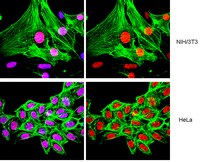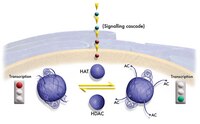Role of 14-3-3? in poor prognosis and in radiation and drug resistance of human pancreatic cancers.
Zhaomin Li,Zizheng Dong,David Myer,Michele Yip-Schneider,Jianguo Liu,Ping Cui,C Max Schmidt,Jian-Ting Zhang
BMC cancer
10
2009
Pokaż streszczenie
Pancreatic cancer is the fourth leading cause of death in the US. Unlike other solid tumors such as testicular cancer which are now curable, more than 90% of pancreatic cancer patients die due to lack of response to therapy. Recently, the level of 14-3-3? mRNA was found to be increased in pancreatic cancers and this increased expression may contribute to the failure in treatment of pancreatic cancers. In the present study, we tested this hypothesis. Pełny tekst artykułu | 21040574
 |
Expression of cyclooxygenase-2, P-glycoprotein and multi-drug resistance-associated protein in canine transitional cell carcinoma.
J-Y Lee,S Tanabe,H Shimohira,Y Kobayashi,T Oomachi,S Azuma,K Ogihara,H Inokuma
Research in veterinary science
83
2007
Pokaż streszczenie
Cyclooxygenase-2 (COX-2), P-glycoprotein (P-gp) and multi-drug resistance-associated protein (MRP) are considered important tumor-associated proteins in humans and dogs. In the present study, we immunohistochemically evaluated the expression of these proteins in canine patients with transitional cell carcinoma (TCC). Of 52 cases, 30 (57.7%) were positive for COX-2, 40 (76.9%) for P-gp, and only 10 (19.2%) for MRP. In addition, 27 samples (27/52, 51.9%) were positive for two markers, while 3 (5.7%) and 5 (9.6%) cases were positive and negative, respectively, for all three markers. No significant correlations were seen for COX-2 and P-gp on Fisher's exact test and Mann-Whitney's test, but a significance was seen on Spearman's rank correlation analysis using the IHC scoring system (P=0.043). These results suggest that P-gp expression is induced by overexpression of COX-2 in canine patients with TCC. | 17316722
 |











